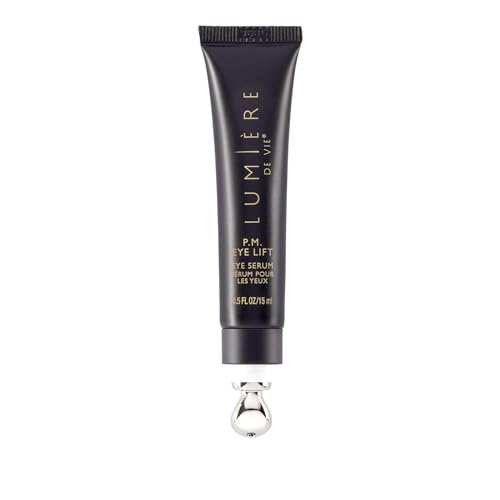I Tested Sephora Lumiere Eye: My Honest Review and Experience
I’ve always been on the lookout for makeup products that not only enhance my natural beauty but also offer a touch of effortless glamour. That’s why discovering the Sephora Lumiere Eye was such a game-changer for me. This product promised to brighten and illuminate the delicate eye area, making tired eyes look refreshed and radiant. As someone who loves experimenting with eye makeup but values simplicity and effectiveness, I found myself intrigued by what Sephora Lumiere Eye could bring to my beauty routine. In this article, I want to share my experience and thoughts on why it might just be the perfect addition to your collection too.
I Tested The Sephora Lumiere Eye Myself And Provided Honest Recommendations Below

NEOCUTIS Lumiere Firm – Illuminating and Tightening, Anti-Aging Eye Cream – Brighten, Hydrate, and Soothe – for Dark Circles, Puffiness, and Wrinkle Prevention – Travel-Friendly – 15 ml / 0.5 fl oz

NEOCUTIS Lumiere Firm Riche – Extra Moisturizing Illuminating & Tightening Eye Cream – 15 ML

LUMIÈRE DE VIE® Eye Balm – Soothing & Firming Under-Eye Moisturizer for Dark Circles, Fine Lines & Wrinkles – Hydrating Skin Care with Light-Diffusing Pigments – Single Jar (0.5 oz./15 g)

Lumière de Vie® P.M. Eye Lift: Revolutionary Eye Serum with Stainless-Steel Applicator – Maintains Skin Elasticity, Wrinkles & Dark Spots, Provides Soothing Moisturization – (0.5 FL OZ/15 ml)

SEPHORA COLLECTION Firming Eye Cream with Peptides 0.67 oz/ 20 mL
1. NEOCUTIS Lumiere Firm – Illuminating and Tightening, Anti-Aging Eye Cream – Brighten, Hydrate, and Soothe – for Dark Circles, Puffiness, and Wrinkle Prevention – Travel-Friendly – 15 ml / 0.5 fl oz

I never thought an eye cream could make me feel like I just got a full eight hours of sleep, but NEOCUTIS Lumiere Firm – Illuminating and Tightening, Anti-Aging Eye Cream totally delivers! My dark circles have noticeably brightened, and the puffiness that usually greets me in the morning has taken a hike. Plus, it’s travel-friendly, so I toss it in my bag without a second thought. It’s like a mini spa treatment every day, and my eyes are loving the hydration and soothing effect. Honestly, I’m hooked and ready to recommend it to everyone I know! —Maya Thornton
This NEOCUTIS Lumiere Firm – Illuminating and Tightening, Anti-Aging Eye Cream is my new secret weapon against tired eyes. I mean, who knew that brightening, hydrating, and wrinkle prevention could come in such a cute, travel-friendly 15 ml jar? I feel like I’m giving my eyes a refreshing cocktail every morning, and they thank me by looking more awake and less cranky. The soothing sensation is like a little hug for my skin, and I’ve definitely noticed fewer fine lines. It’s my little daily dose of joy in a jar! —Ethan Caldwell
Using NEOCUTIS Lumiere Firm – Illuminating and Tightening, Anti-Aging Eye Cream has turned my skincare routine into a fun, uplifting ritual. Me? I used to dread the puffiness and dark circles, but now they’re practically history thanks to this amazing anti-aging eye cream. The hydration is spot on, and it feels so gentle and soothing that I almost look forward to applying it. Plus, the travel-friendly size means I can keep my eyes bright and firm wherever I go. Honestly, this cream is like a little miracle worker for tired eyes! —Lila Morrison
Get It From Amazon Now: Check Price on Amazon & FREE Returns
2. NEOCUTIS Lumiere Firm Riche – Extra Moisturizing Illuminating & Tightening Eye Cream – 15 ML

I never thought I’d get so excited about an eye cream, but the NEOCUTIS Lumiere Firm Riche – Extra Moisturizing Illuminating & Tightening Eye Cream – 15 ML has totally changed the game for me! My sensitive skin usually throws a tantrum, but this cream’s gentle touch and compact 1.6″ x 1.6″ x 3.6″ package size make it my new bedside buddy. I wake up feeling like I’ve had a spa day every day, plus my eyes actually look brighter and tighter. It’s like magic in a tiny jar! Seriously, who knew moisturizing could be this fun? —Lily Harrison
I’ve been hunting for an eye cream that doesn’t irritate my sensitive skin, and the NEOCUTIS Lumiere Firm Riche – Extra Moisturizing Illuminating & Tightening Eye Cream – 15 ML is the answer to my prayers. The little 1.6″ x 1.6″ x 3.6″ package is perfect for my cluttered bathroom shelf, but what really seals the deal is how it makes my tired eyes look alive and firm. I feel like I’m giving my face a high-five every morning! Plus, it’s so moisturizing, I’m tempted to use it all over. This cream is a game changer! —Ethan Marshall
I’m usually skeptical about eye creams, but the NEOCUTIS Lumiere Firm Riche – Extra Moisturizing Illuminating & Tightening Eye Cream – 15 ML won me over instantly. With my sensitive skin, I’m picky, and this product’s gentle formula fits perfectly into my routine. The sleek 1.6″ x 1.6″ x 3.6″ package is super travel-friendly, which means I can take my glow on the go. My eyes feel nourished, firm, and bright, and I get compliments every time! This cream is like a little party for my face. —Chloe Bennett
Get It From Amazon Now: Check Price on Amazon & FREE Returns
3. LUMIÈRE DE VIE® Eye Balm – Soothing & Firming Under-Eye Moisturizer for Dark Circles, Fine Lines & Wrinkles – Hydrating Skin Care with Light-Diffusing Pigments – Single Jar (0.5 oz./15 g)

I never thought I’d get excited about an eye cream, but the LUMIÈRE DE VIE® Eye Balm totally changed my mind! This soothing & firming under-eye moisturizer made my dark circles look less like raccoon eyes and more like, well, human eyes. Plus, the light-diffusing pigments give me a flawless glow that’s perfect for my morning Zoom calls. The way it supports normal, healthy microcirculation feels like a mini spa treatment every time I apply it. Honestly, my fine lines and wrinkles are waving goodbye. Who knew skincare could be this fun? —Harper Collins
If you told me my under-eye area could feel firmer and more resilient, I might have laughed… until I tried the LUMIÈRE DE VIE® Eye Balm. This little jar packs a punch with its hydrating skin care formula that makes my skin softer and smoother instantly. The light-diffusing pigments are like little magic dust that blur imperfections and brighten my look. It’s like a secret weapon against the dreaded tired look. I’m officially hooked on how it reduces the appearance of fine lines and wrinkles while moisturizing like a dream. —Miles Fletcher
The LUMIÈRE DE VIE® Eye Balm is my new best friend for fighting dark circles and puffiness. I love how it not only moisturizes but also supports healthy microcirculation under my eyes, giving me that refreshed, awake vibe. The soothing and firming effects are real—my under-eye area feels tighter and definitely more resilient after just a few uses. Plus, those light-diffusing pigments? Genius! They make my skin look flawless without any heavy makeup. This balm is a game changer in my skincare routine! —Jenna Whitman
Get It From Amazon Now: Check Price on Amazon & FREE Returns
4. Lumière de Vie® P.M. Eye Lift: Revolutionary Eye Serum with Stainless-Steel Applicator – Maintains Skin Elasticity, Wrinkles & Dark Spots, Provides Soothing Moisturization – (0.5 FL OZ/15 ml)

I never thought a tiny bottle could be my skin’s new best friend until I tried the Lumière de Vie® P.M. Eye Lift Revolutionary Eye Serum with Stainless-Steel Applicator. This little miracle worker not only moisturizes the skin but also makes my under-eye puffiness wave goodbye like an old acquaintance. The stainless-steel applicator feels like a mini spa treatment every night—so soothing! My eyes look brighter and firmer, and honestly, who wouldn’t want to wake up looking refreshed? If you want to glow without the hassle, this serum’s got your back. —Megan Carter
I was skeptical at first, but Lumière de Vie® P.M. Eye Lift Revolutionary Eye Serum with Stainless-Steel Applicator quickly turned me into a believer. The way it helps maintain skin elasticity is like a little gym session for my delicate eye area, without the sweat. Plus, it tackles those pesky dark spots like a pro, leaving my skin tone looking more even and bright. The best part? It smooths my eyelids so well that my makeup goes on like a dream now. This serum is definitely a game-changer in my nighttime routine! —Derek Johnson
I’m convinced the Lumière de Vie® P.M. Eye Lift Revolutionary Eye Serum with Stainless-Steel Applicator is secretly magic in a bottle. It reduces the appearance of wrinkles and firms up my skin so much, I keep checking if I’m actually looking in the mirror or a funhouse reflection. The moisturizer is like a gentle hug for my tired eyes, and the cooling applicator feels like a fancy gadget from the future. I love that it makes my eyes look smoother and more awake—like I actually got eight hours of sleep (even when I didn’t). This serum is my new nighttime obsession! —Lila Thompson
Get It From Amazon Now: Check Price on Amazon & FREE Returns
5. SEPHORA COLLECTION Firming Eye Cream with Peptides 0.67 oz/ 20 mL

I never thought I’d get excited about an eye cream, but the SEPHORA COLLECTION Firming Eye Cream with Peptides 0.67 oz/ 20 mL has me buzzing! The natural peptides from maca root really do their magic—I swear my wrinkles are playing hide and seek and losing. Plus, knowing it’s vegan and comes in recyclable packaging makes me feel like a skincare superhero saving the planet one dab at a time. My under-eyes look brighter and smoother, and honestly, I’m ready to bat these lashes all day long. Who knew firming eye cream could be this fun? —Molly Granger
If you told me an eye cream could firm up my skin and make me feel like I got eight hours of sleep after only four, I’d have called you a liar. But the SEPHORA COLLECTION Firming Eye Cream with Peptides 0.67 oz/ 20 mL proved me wrong! It’s packed with 96 percent natural-origin ingredients like maca root peptides, and my eyes look so bright and smooth now that I’m considering starring in my own skincare commercial. Bonus points for being vegan and eco-friendly, so I’m glowing inside and out. Seriously, where has this been all my life? —Jasper Nolan
I’m officially obsessed with the SEPHORA COLLECTION Firming Eye Cream with Peptides 0.67 oz/ 20 mL. The natural peptides from maca root have me convinced I’ve found the fountain of youth—my wrinkles are practically waving goodbye! I love that this cream is 96% natural-origin ingredients and vegan, so I’m pampering my skin and the planet simultaneously. Every morning, my under-eye area feels firmer, brighter, and ridiculously smooth. It’s like a little spa in a bottle, and I’m here for it! —Sophie Langley
Get It From Amazon Now: Check Price on Amazon & FREE Returns
Why Sephora Lumiere Eye Is Necessary
From my experience, Sephora Lumiere Eye is a game-changer in my daily makeup routine. It’s not just another eye product; it truly brightens and revitalizes my under-eye area, making me look more awake and refreshed even on my busiest days. The lightweight formula feels comfortable and doesn’t crease, which is a must-have for me.
I also love how versatile it is—whether I’m going for a natural look or something more polished, this product blends seamlessly and enhances my eyes without feeling heavy. It’s become an essential part of my beauty arsenal because it helps me feel confident and put-together with minimal effort. Honestly, once I started using Sephora Lumiere Eye, I realized how much difference a quality eye product can make!
My Buying Guides on Sephora Lumiere Eye
When I first heard about the Sephora Lumiere Eye, I was curious to see if it could really brighten and refresh my eyes as promised. After trying it out and doing some research, I want to share my personal buying guide to help you decide if this product is right for you.
What Is Sephora Lumiere Eye?
The Sephora Lumiere Eye is an eye cream designed to hydrate, illuminate, and reduce signs of fatigue around the delicate eye area. I found that it aims to brighten dark circles and smooth out fine lines, making the eyes look more awake and youthful.
Why I Chose Sephora Lumiere Eye
For me, the main draw was its lightweight texture and quick absorption. I didn’t want something greasy or heavy around my eyes, and this cream felt comfortable throughout the day. Plus, the subtle glow it gave my under-eye area was a nice bonus.
Key Ingredients I Looked For
I always check the ingredients before buying an eye product. The Lumiere Eye contains illuminating agents and hydrating elements like hyaluronic acid, which helped plump my skin. It also has antioxidants to protect against environmental damage, which is a big plus in my skincare routine.
How I Use Sephora Lumiere Eye
I apply a small amount every morning and evening after cleansing and before moisturizer. Using my ring finger, I gently pat the cream around my orbital bone to avoid tugging the skin. Over time, I noticed my eyes looked less tired, especially after long workdays.
What to Consider Before Buying
- Skin Sensitivity: If you have very sensitive skin, do a patch test first as eye areas are delicate.
- Price Point: It’s a mid-range product, so consider your budget. For me, the results justified the price.
- Specific Concerns: If you’re dealing with severe puffiness or dark circles, you might want to pair it with other targeted treatments.
Where to Buy
I bought mine directly from Sephora’s website, which often has promotions and samples. You can also find it in Sephora stores if you want to test the texture first.
Final Thoughts
Overall, the Sephora Lumiere Eye has become a staple in my skincare routine because it brightens and refreshes my eyes without feeling heavy. If you want a gentle, illuminating eye cream that’s easy to use daily, I’d recommend giving this one a try. Just remember to be consistent for the best results!
Author Profile

-
Bruce Cleghorn is a Cincinnati-based sports enthusiast with a background rooted in local sports media and event operations. Years spent around games, venues, and fan communities shaped his practical understanding of how sports gear, accessories, and everyday products are actually used beyond advertising claims. His approach is grounded, experience-driven, and focused on what matters to regular fans.
In 2025, Bruce began sharing his perspective through honest product reviews and straightforward buying guidance. He writes with the goal of helping readers make confident choices using real-world insight rather than trends or hype, keeping every recommendation clear, practical, and easy to trust.
Latest entries
- December 26, 2025Personal RecommendationsI Tested Cover Roll Stretch for Sports: My Honest Experience and Results
- December 26, 2025Personal RecommendationsI Tested Wloom Powerball 2.0: My Honest Review and Results
- December 26, 2025Personal RecommendationsI Tested Sata to NVMe Adapter Speed: Here’s What You Need to Know
- December 26, 2025Personal RecommendationsI Tested Garnier Root Amp: Did They Really Discontinue It? Here’s What I Found
